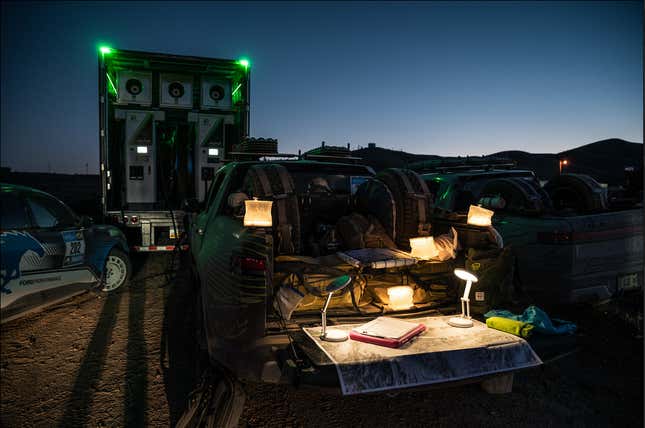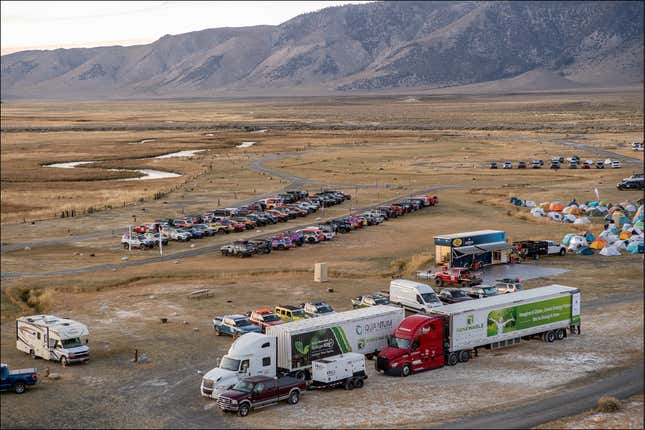
For an old school map and compass navigation rally, the Rebelle Rally is going all in when it comes to plugging in. As long as it’s the car, not your phone or GPS device. Those you have to leave at home.
In 2023, there are 12 vehicles running with the Electrified designation in the 1600-mile off-road contest that starts in the California mountains and lands seven days later in the largest sand dunes in North America at the California/Mexico border. Rivians, 4xe Rubicon Wranglers, a couple of Toyota Sequoia and Tundras and even a Ford Mustang Mach-e that’s been rallied out are vying for top plug-in prize. The all-woman teams are plotting points on a map using only a ruler and plotter then going out into the wild with just the map and a compass to try and track all those points down.

EV naysayers are myriad. There are so many people who have a hard time wrapping their head around how they’d charge a car in their own neighborhood. So, how do you get out into the middle of nowhere without a gas-powered car that allows you to stock up on gas cans for emergencies? If you run out of charge, there simply isn’t a plug over at that second cactus.
Enter Renewable Innovations (RI), the power provider for the electrified vehicles of the Rebelle. And they’re not just powering cars but supporting the rally’s entire basecamp infrastructure using both hydrogen and solar power.
Hydrogen power comes from the Mobile Energy Command – Hydrogen Powered EV Rapid Charging (MEC-H2EV) station. Housed in a big rig, their virtual pipeline holds about 800 kg of hydrogen. That hydrogen is converted into electricity by eight fuel cells then stored in batteries that are then used to charge up the competitor vehicles.

That one MEC-H2EV will fuel all 12 electrified entrants for the entire week from the rally’s starting line in Mammoth Mountain, about five hours drive from Los Angeles, to those intimidating dunes in Glamis. This mobile station is capable of delivering 360 kW of DC rapid charge for automobiles. A full charge can take around 20 minutes depending on the vehicles’ charging capacity.
Competitors pull up to the RI truck that comes with four charge stations. The MEC-H2EV has three CCS plugs, which all the competitors have on their cars for this year. The final plug is fit with a CHAdeMO plug. No cars on the rally utilize that connector, which is being phased out in parts of the world. RI are also set up to provide three plug-in hybrids with power.
Each EV competitor gets 30 minutes off the clock to charge. But competitors aren’t allowed to look at their maps while they wait. Driver and co-driver can’t even sit in the same spot. There’s no conferring as this could be seen as giving competitors an advantage of more time to plot or strategize. (As a competitor in a gas-powered car, this forced 30 minutes of down time sounds luxurious, to be honest). They do make up the 30 minutes at the back end of the rally and coming into base camp after dark is no picnic.
Base camp, which plays home to about 250-300 people including staff and competitors, utilizes the MEC – Solar unit, a 53- foot mobile power system that looks more like a piece of machinery that NASA’s using to contact E.T. than one that would power a mini city in the desert. This MEC-S features an enclosure lined with high-density solar panels in between two “follow-the-sun” Smart flowers which collectively offer up 50 KW of power for the Rebelle base camp to use for lights, heat or AC, to run the food truck, and power all the media equipment for their live YouTube broadcasts. That’s enough power to run six to eight homes for a day. Bonus? Fuel cells are silent, so now that rally organizers are no longer using generators, the only thing keeping teams up at night are the competitors who snore.
Both of these systems mean that the 2023 Rebelle Rally will be powered 100-percent by zero-carbon renewable energy. With governments on both the local and federal level dolling out mandates when it comes to electrification of vehicles and green energy like Jolly Ranchers at Halloween, the Rebelle’s partnering with RI puts them ahead of the curve when it comes to motorsports and the inevitable shift that’s coming for them, too.
Yes, there’s an elephant in the room, which is the big rig truck that gets both MEC-S and MEC- H2EV there. Some will moan that the fuel to move all this equipment is offsetting all the good green energy. Not so. And as soon as there’s a hydrogen powered rig for them to truck their EV solutions around in, you can bet they’ll have one.